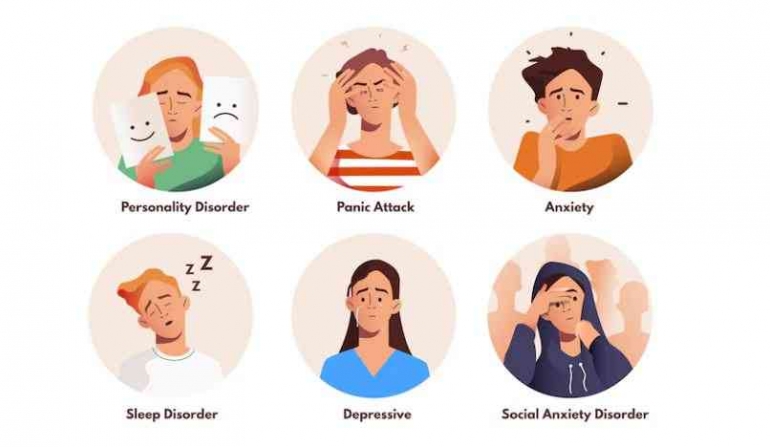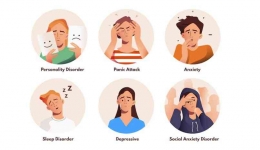While the world is focusing on physical health as a result of the Covid-19 pandemic, mental health symptoms are also a severe issue. Studies show that quarantined individuals have a higher psychological risk of depression, emotional problems, irritation, stress & insomnia. A study of the mental health condition of Indonesians during the Covid-19 pandemic showed that the prevalence of mental health conditions in Indonesia was first nationally indicated by depression and anxiety. According to previous Riskesdas findings, mental disorders began to appear between the ages of 15 and 24 and are increasing with age. Several uncertainties that emerged during the pandemic, such as changes in learning adaptation, layoffs, and financial problems as a result of the economy's negative effects, caused younger people to experience mental health problems.
People with mental disorders experience disproportionately higher rates of disability & mortality. For example, persons with major depression and schizophrenia have a 40 % - 60 % greater chance of dying prematurely than the general population, owing to physical health problems that are often left unattended (such as cancers, cardiovascular diseases, & diabetes) and suicide. Suicide is the second most common cause of death among young people worldwide .
Determining which mental illness type, the doctor may have "A psychological evaluation". A doctor or mental health professional talks to patient about their symptoms, thoughts, feelings and behavior patterns. They may be asked to fill out a questionnaire to help answer these questions. The defining symptoms for each mental illness are detailed in the Diagnostic and Statistical Manual of Mental Disorders (DSM-5), published by the American Psychiatric Association. Common signs and symptoms of mental illness can include the following: Feeling sad, reduced ability to concentrate, excessive fears or worries, extreme mood changes, withdrawal from friends and activities, and significant tiredness/ problems sleeping.
The main classes of mental illness are neurodevelopmental disorders, schizophrenia spectrum and other psychotic disorders, bipolar and related disorders, depressive disorders, anxiety disorders, obsessive-compulsive and related disorders,trauma- and stressor-related disorders, Dissociative disorders, somatic symptom and related disorders, feeding and eating disorders, Elimination disorders, sleep-wake disorders, sexual dysfunctions, gender dysphoria, disruptive, impulse-control and conduct disorders, substance-related and addictive disorders, neurocognitive disorders, personality disorders, paraphilic disorders and other.
Treatment of mental illnes depends on the type, severity and what works best for patient. In many cases, a combination psychological approaches and the use of medication works best. Treatments include medication ( antidepressants, anti-anxiety medications, mood-stabilizing medications, and antipsychotic medications), psychotherapy (talk therapy), Brain-stimulation treatments (sometimes used for depression and other mental health disorders), and Hospital and residential treatment programs (Sometimes mental illness becomes so severe & patient need care in a psychiatric hospital).
Mental illness impacts how you think, feel and behave. They can make it difficult to function at home, school or work. Getting an accurate diagnosis is the first step toward managing a mental health disorder. Talk to your healthcare provider if you or your child show any signs or symptoms. Contact them as soon as you notice there's a problem.










